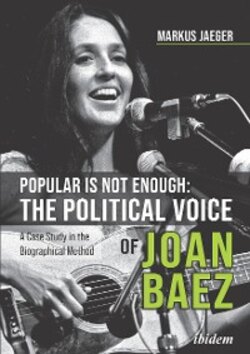Читать книгу Popular Is Not Enough: The Political Voice Of Joan Baez - Markus Jaeger - Страница 9
1.2 Reconstituting Culture: On the Significance of Social Movements
ОглавлениеSocial movements offer a concrete manifestation of the melting borderline between culture and politics. Apart from being driven by instantly recognizable political issues, Chester and Welsh summarize their essence in the following definition: for them, social movements are networks, which “[…] have employed confrontational, imaginative, and highly symbolic repertoires of collective action based upon the ethos of ‘direct action for direct democracy’ […]” (Chester and Welsh, 97). Chapters 4 until 10 of this study present a chronological analysis of the way Baez has supported a variety of social movements throughout her career. Their significance for social change can not be underestimated, as they form appropriate forces for the development of culture; or—in the words of Eyerman and Jamison—they are “[…] central moments in the reconstitution of culture […]” (Eyerman and Jamison 6). While social movements are driven by particular political intentions—their efforts can shape significant breaks in the cultural development of society.
For a public figure like Joan Baez, artistic work alone is not enough to lead a satisfying professional life. She uses her fame as a singer and songwriter of national and international renown to support initiatives which successfully co-create a political climate in which the constant attempt to revive organized non-violence turns into a (repeatedly successful) means of overcoming organized violence. One of the most important conditions for such a course of action is the implementation of social movements, which represent the main professional platform for an artist and activist like Baez. Eyerman and Jamison constructively define the importance of social movements, already connecting it to the field of popular culture: “[…] through their impact on popular culture, mores, and tastes, social movements lead to a reconstruction of processes of social interaction and collective identity formation […]” (Eyerman and Jamison 10). This study directs its main attention to the various ways a politically active singer like Baez can influence these processes. Two questions summarize the challenge of this research aim: How shall the humanities—which include the analysis of popular culture—deal with specific political positions? How shall the social sciences—which include the analysis of specific political positions—deal with artifacts of popular culture? Eyerman and Jamison mark the reason why these two questions include a cultural and political dimension at the same time and depict the role which social movements play in the melting process of these two dimensions:
[…] by combining culture and politics, social movements serve to reconstitute both, providing a broader political and historical context for expression, and offering, in turn, the resources of culture—traditions, music, artistic expression—to the action repertoires of political struggle […] (Eyerman and Jamison 7).
The process of using cultural resources (while being politically active) has to be examined carefully on the edge of potential ideological abuse. Artistic influence on social movements undeniably has to face the possibility of instrumental use: this danger, nonetheless, is no reason to stop any further debate about the combination of popular music and political activism, because “[…] to the extent that social movements are able to transcend these instrumental (and commercial) usages, music as exemplary action becomes possible.” (Eyerman and Jamison 24). Organized political activity and artistic expression (in our case: the work of a popular singer) can be intertwined, transcending possible ideological or party-political abuse.
Reproaching this coalescence within social movements with commercial interests and lack of political credibility does not dismiss all of its potential. Eyerman and Jamison seriously doubt whether, for example, music theorist Theodor W. Adorno is right with his assumption that people (who are those people?) merely listened to the radio and not to the music on the radio (see also Eyerman and Jamison 137). The aim of this study is to verify the truth behind this doubt (chapter 1.4 has a particularly close look at Adorno’s approach to popular culture and the authenticity of politically active artists). On the one hand, songs can be able to enhance the political struggle of social movements, which, on the other hand, “[…] provide a cohesiveness, a kind of social glue, that reconfigures the relations between culture and politics […]” (Eyerman and Jamison 78). Throughout her whole career, Baez has offered her own work to the work of social movements and has thereby non-violently added relevant “[…] social glue […]” (Ibid.) to their passionate political efforts. The main methodological approach to analyze this contribution is the biographical method.
